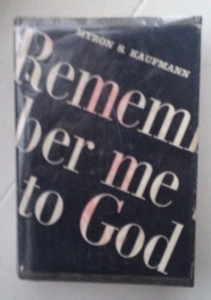Pre-Shabbat Jewish Lit Links

Every Friday My Machberet presents an array of Jewish-interest links, primarily of the literary variety.
Shabbat shalom!

Every Friday My Machberet presents an array of Jewish-interest links, primarily of the literary variety.
Shabbat shalom!

Shabbat shalom–and see you next week!
Oh, what a busy time it has been!
A Book is Born
 It’s a BIG week for all of us at Fig Tree Books. Yesterday was the official publication date for our first title, a novel by Alan Cheuse titled Prayers for the Living. (Let’s just say that I spent a lot more of my weekend time working for the “day job” this past Saturday/Sunday than I normally do! But I certainly wasn’t alone in putting forth some extra pre-publication efforts.)
It’s a BIG week for all of us at Fig Tree Books. Yesterday was the official publication date for our first title, a novel by Alan Cheuse titled Prayers for the Living. (Let’s just say that I spent a lot more of my weekend time working for the “day job” this past Saturday/Sunday than I normally do! But I certainly wasn’t alone in putting forth some extra pre-publication efforts.)
If you’re in Brooklyn or Washington, you can attend readings that Alan will be giving this week at BookCourt and Politics and Prose, respectively. Details on the Fig Tree Books website. Oh, and there’s a new issue of the Fig Tree Books newsletter available, too. (more…)

“Though it was hailed on publication as one of the finest novels ever written about American Jews and remained on The New York Times bestseller list for an entire year,” Josh Lambert has written for Tablet, “almost no one remembers [Myron S. Kaufmann’s Remember Me to God] today. It goes unmentioned in bibliographies of American Jewish fiction, and so obscure is Kaufmann in this Internet age that searching for his name turns up nary a stub on Wikipedia.”
Lambert’s essay explores the possible reasons behind the book’s obscurity. Having recently immersed myself in the novel (you can find a summary here), I can appreciate Lambert’s arguments and hypotheses. I’m in particular agreement with the suggestion that one should accord attention and respect to the characters of Adam Amsterdam and his daughter Dorothy. But I can’t get away from how unpleasant—dare I say, how unsympathetic—I found the ostensible protagonist, Richard Amsterdam (Adam’s son and Dorothy’s brother).
This character is so repellent that he made it challenging for me to stick with the novel—which runs more than 600 pages—despite the book’s unquestionable artistic merits as (again borrowing from Lambert) “a finely wrought triumph of midcentury realism.” Like Lambert, I have personal connections to Harvard, where much of the novel unfolds, and innumerable details within the novel struck chords of not-unpleasant memory. But Richard Amsterdam (and, to a lesser extent, Richard’s mother) so appalled me that I’m not sure how comfortable I’d feel recommending this book to others without some warnings.
Still, I can understand Lambert’s enthusiasm. And I’m not sorry that I read it.
Have you read Remember Me to God? What was your take?
 Monday brings the weekly batch of no-fee competitions/contests, paying submission calls, and jobs for those of us who write (especially those of us who write fiction, poetry, and creative nonfiction). (more…)
Monday brings the weekly batch of no-fee competitions/contests, paying submission calls, and jobs for those of us who write (especially those of us who write fiction, poetry, and creative nonfiction). (more…)